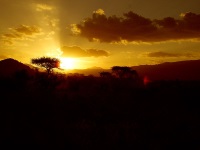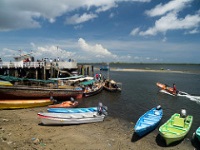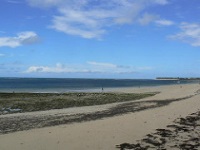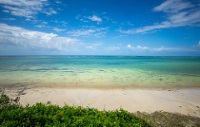The Kenyan Coast Travel Guide
The Kenyan coast is lined with a mixture of beautiful white-sand beaches and tourist resorts, interspersed with Arab and Portuguese forts, overgrown ruins of Swahili outposts, and old trading port towns that are the remnants of its fascinating history.
Spectacular coral reefs with colourful plant and fish life provide world-class snorkelling and diving among pristine coral gardens in the pleasantly warm waters of the Indian Ocean. The marine parks at Malindi, Watamu Bay, and Shimoni contain undisturbed coral reefs and enormous fish due to the lack of coastal fishing traffic.
Mombasa is the centre of activity in the region and Kenya's second largest city. North of Mombasa, the coast is lined with resort complexes catering mainly to package tourists, with luxury accommodation, fine cuisine, and excellent services. Calm waters and palm-backed beaches are in abundance. Further north is the resort town of Malindi, as well as Watamu Bay and the islands of the Lamu Archipelago.
Things to do in The Kenyan Coast
The coast of Kenya is idyllic and, apart from its lovely palm-fringed beaches, colourful underwater worlds, and luxury resorts, it is also an interesting region historically. When visitors have had their fill of the sun and sea, they can explore ancient Arab and Portuguese forts and old Swahili outposts.
Mombasa is likely to be the starting point of coastal explorations in Kenya and, although the port city can be quite overwhelming, there are some worthwhile tourist attractions for those who have time to spare before hitting the beaches.
The Tsavo National Park is a short distance from the city and provides a great opportunity for some game viewing. North of Mombasa the coast has luxury resorts that capitalise on the rich coral reefs and beautiful scenery. Malindi is a popular resort town and the islands of the Lamu Archipelago are also delightful.
The south coast of Kenya was once remote and inaccessible, covered in lush forest and infamous for its slave trade and tropical plantations. But today, little of the forest remains and it has become part of Kenya's mainstream tourist trade.
The region's popularity is due to its image as a haven of unspoilt white-sand beaches and azure seas, where calm waters and well-preserved coral reefs invite underwater exploration. The coast is host to a wide range of resorts offering excellent facilities, but has many less developed getaways as well. The small fishing village of Shimoni is home to a series of deep coastal caves and is a popular base for diving and deep-sea fishing.

Tsavo National Park
The vast Tsavo National Park is only an hour's drive from Mombasa. The park has giraffes, buffalo and antelope, as well as monkeys, many exotic birds and Kenya's largest herds of elephants. Visitors are also likely to see rhinos, whose population now numbers almost 200 after they virtually wiped out by poachers.
Another exciting attraction is an observation tank in one of the park's pools from which visitors can get a close-up view of hippos, crocodiles and tropical fish in their natural habitat. Some of the roads in the park are in bad condition and it can be difficult driving, though game drives will be problem free if they're organised.

Lamu
A gentle and relaxed holiday destination, Lamu is Kenya's oldest inhabited town and the unhurried way of life has changed little over the centuries. Part of the Lamu Archipelago, it's reached by boat from the mainland. The narrow, winding streets are crowded with pedestrians, markets, vendors and donkeys.
Lamu's lovely old Arab houses feature intricately carved doors and lintels, and mosques decorate the streets of one of the last remaining Swahili towns from a civilisation that used to be the cultural force along the coast. A dhow trip is a mandatory holiday outing and sailing around the little islands or to the beautiful beaches is a memorable experience.
The Takwa ruins on Manda Island and ancient settlements on Pate are great attractions too, and the beautiful whites sands of Shela Beach are popular for sunbathing and watersports. For a sense of local history and Swahili culture, visitors can explore the Lamu Museum, the Swahili House Museum or Lamu Fort.

Malindi
Situated on the beach 60 miles (40km) north of Mombasa is the lazy and unashamedly hedonistic holiday resort of Malindi, its dazzling white-sand beaches lining the shore. The more adventurous should join the excellent fishing trips in Malindi, which leave early before the heat of the day sets in, in search of barracuda, tuna and marlin.
The cross of Vasco da Gama is one of the few authentic Portuguese relics left on the coast and commemorates the famous explorer's arrival here in 1498. It can be found on the cliffs near Malindi Harbour.
South of Malindi are the Watamu and Malindi Marine National Parks, protected areas of white-coral beaches and stunning, crystal-clear blue lagoons attracting many snorkelers and scuba divers. Between the two marine parks is the abandoned 15th century Swahili town of Gedi, where visitors can wander the ruins of the palace, market place, houses, mosques and pillared tombs.

Mombasa
The hot and humid holiday destination of Mombasa is the biggest port on the east coast of Africa. Situated on an island linked to the mainland by bridges, it's surrounded by a natural harbour where commercial shipping mixes with traditional sailing dhows.
The main Mombasa holiday attraction is the commanding 16th-century fort that protects the entrance of the harbour, Fort Jesus, whose remnants relay the story of a historic struggle for control of the coast between the Portuguese and Arabs.
The Government Game Department's Ivory Room exhibits elephant tusks, rhinoceros horns and hippopotamus teeth, along with other animal trophies confiscated from poachers or taken from dead animals on the reserve. Mombasa's Old Town retains a strong Arab flavour, its winding streets and crammed faded houses alive with the colours of the traditional wrap-around clothing and street sellers.
Kenya travel info
Electricity
The electrical current is 240 volts, 50Hz. UK-style square three-pin plugs are used.
Language
English is the official language but Swahili is the national language, with 42 ethnic languages spoken.
Money
The unit of currency is the Kenyan shilling (KES), which is divided into 100 cents. It is not advisable to take Kenyan Shillings out of the country, as they are difficult to exchange elsewhere. Foreign currency can be changed at banks, bureaux de change and hotels. It's easiest to exchange US dollars, pounds sterling or euros. International credit cards are accepted in the larger hotels and stores, and some camps and lodges. ATMs are widely available in Nairobi and other major towns.
Tipping
Tipping is not customary in Kenya, though a 10 percent service charge may be added to the bill in more upmarket restaurants. Small change in local currency may be offered to taxi drivers, porters and waiters; safari drivers, guides and cooks often rely heavily on tips to get by, but these are discretionary.
Health
Travellers should get the latest medical advice on vaccinations and malaria prevention at least three weeks prior to departure. A malaria risk exists all year round in Kenya, but more so around Mombasa and the lower coastal areas than in Nairobi and on the high central plateau. Immunisation against yellow fever, polio and typhoid are usually recommended. A yellow fever certificate is required by anyone arriving from an infected area. Other risks include diarrheal diseases. Protection against bites from sandflies, mosquitoes, and tsetse flies is the best prevention against malaria and dengue fever, as well as other insect-borne diseases, including Rift Valley fever, sleeping sickness, leishmaniasis and Chikungunya fever. Water is of variable quality and visitors are advised to drink bottled water. There are good medical facilities in Nairobi and Mombasa but travel insurance is always advised.
Safety
There is a threat from Somali terrorist groups in Kenya and visitors should be vigilant in public places and tourist sites. Several bombings have targeted Mombasa, Nairobi and other cities in recent years, most blamed on the Al Qaeda-linked Al-Shabaab group. Several governments have instituted travel warnings and alerts for parts of Kenya and travellers are advised to read up on the situation and which areas should be avoided before visiting the country.
Visitors should be alert to the threat of robberies and muggings at all times in Nairobi, but particularly at night. They should also be vigilant in Mombasa.
Banditry occurs in the northern areas and there have been armed attacks in the resort areas of northern Kenya near the border of Somalia. Several governments have advised against all but essential travel to coastal areas within 93 miles (150km) of the Somalian border, and inland areas within 37 miles (60km) of the border.
Piracy has also been a concern off the coast of Kenya. There have previously been incidents of attacks and hijackings of private vessels, though there have been no recent reports. Visitors should also take sensible precautions when driving. In particular, landmines have been used in attacks around Moyale, close to the main A2 road south. Vehicles crossing the border at this point should stay on the A2.
Local customs
Taking of photographs of official buildings is not advised and could lead to detention; photography is prohibited at airports. Coastal towns are predominantly Muslim and religious customs and sensitivities should be respected, particularly during Ramadan. Dress should be conservative away from the beaches and resorts, particularly for women. Homosexuality is against the law. Smoking in public places is illegal, other than in designated smoking areas, and violators will be fined or imprisoned.
Doing business
Business in Kenya tends to be conducted formally and conservatively, with the appropriate attire of a jacket and tie. Patience, cultural sensitivity, tolerance for uncertainty and the ability to build personal relationships with business associates are all central to successfully doing business in the country.
Ethnic division and corruption undermine the Kenyan economy, but they are realities in the business world of Kenya. Despite red tape and numerous pitfalls, Kenya is a land of business opportunity and the IT and telecoms sectors are rapidly expanding.
The concept of harambee is important in local business culture, and involves a sense of community, responsibility and mutual assistance. Deference to seniority is important, as is social standing, while using official titles is key during introductions and greetings.
Terse statements should be avoided and controlling one's emotions is vitally important. While punctuality is key and meetings should begin on time, they often don't end on time. When introducing a new deal, it's important to illustrate respect for tradition and history. Deals generally only close when it is clear that all the possible information has been considered and deliberated upon.
Interpersonal relationships add to business success, and understanding Kenyan culture and history is a great way of building business contacts. Building a solid business relationship is prioritised over meeting deadlines and closing deals.
English is the language of business. Business hours run from 9am to 5pm on weekdays and dress style should be formal with suits or smart-casual wear. Gifts are important and generally expected. Taking time to greet everyone and enquire about the health of their family will ensure a smooth business meeting.
Respect for elders is important too, and if foreigners are invited to dinner, they should never begin eating until the eldest member has started. Also, foreigners should refrain from leaving food on their plate. In introductions, clasping an elder or key business associate's wrist with the other hand while shaking hands conveys respect.
Duty free
Travellers to Kenya over 18 years do not have to pay duty on 250g tobacco products; 1 litre of spirits; and 500ml perfume. Prohibited items include fruit, imitation firearms, and children's toys pistols. No plants may be brought into the country without a Plant Import Permit (PIP).
Communications
The international access code for Kenya is +254. Area codes are also in use. Purchasing a local SIM card is simple and most hotels, restaurants and cafes in tourist areas offer free WiFi access.
Passport & Visa
All foreign passengers to Kenya must hold proof of sufficient funds to cover their stay in the country, return or onward tickets, and the necessary travel documentation for their next destination. Most foreign nationals require a visa, and some foreign nationals can obtain visas on arrival in Kenya, provided that their passport is in good condition, and they have at least one blank page in their passport for the visa endorsement. The visa fee is payable in USD, GBP or EUR, cash only. On-arrival visas are valid for three months. It is also possible to obtain an e-visa prior to departure for Kenya. A valid, 90 day, multiple entry or re-entry "East African Tourist Visa" issued by Rwanda or Uganda will suffice, provided the passanger in posession of the document has previously entered the country that first issued the visa. A yellow fever vaccination certificate is required to enter Kenya if arriving within six days of leaving or transiting through an infected area. It is highly recommended that travellers' passport have at least six months' validity remaining after the intended date of departure from their travel destination. Immigration officials often apply different rules to those stated by travel agents and official sources.
Entry requirements
US citizens must have a passport valid for at least six months beyond the date of their arrival in Kenya. A visa is required.
British citizens must have a passport that is valid for at least six months beyond the date of their arrival in Kenya. A visa is required.
Canadian citizens must have a passport that is valid for at least six months beyond the date of their arrival in Kenya.A visa is required.
Australian citizens must have a passport that is valid for at least six months beyond the date of their arrival in Kenya. A visa is required.
South African citizens must have a passport that is valid for at least six months beyond the date of their arrival in Kenya. A visa is not required for stays of up to 30 days.
Irish citizens must have a passport that is valid for at least six months beyond the date of their arrival in Kenya. A visa is required.
New Zealand citizens must have a passport that is valid for at least six months beyond the date of their arrival in Kenya. A visa is required.
Useful contacts
Kenyan Tourist Board: +254 (0)20 271 1262 or www.magicalkenya.com
999 (General Emergencies)Embassies / consulates in other countries
Kenyan Embassy, Washington DC, United States: +1 202 387 6101.
Kenyan High Commission, London, United Kingdom (also responsible for Ireland): +44 (0)20 7636 2371.
Kenyan High Commission, Ottawa, Canada: +1 613 563 1773.
Kenyan High Commission, Canberra, Australia (also responsible for New Zealand): +61 (0)2 6247 4788.
Kenyan High Commission, Pretoria, South Africa: +27 (0)12 362 2249.
Embassies / consulates in Kenya
United States Embassy, Nairobi: +254 (0)20 712 3304.
British High Commission, Nairobi: +254 (0)20 284 4000.
Canadian High Commission, Nairobi: +254 (0)20 366 3000.
Australian High Commission, Nairobi: +254 (0)20 427 7100.
South African High Commission, Nairobi: +254 (0)20 282 7236.
Honorary Consul of Ireland, Nairobi: +254 (0)20 235 7242.
New Zealand Consulate, Nairobi: +254 0(20) 804 5100.



